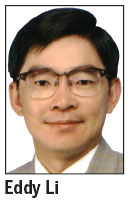Low tax system helps gestate millionaires in Hong Kong
Updated: 2013-07-11 06:05
By Eddy Li(HK Edition)
|
|||||||||
A global wealth survey report released last month by the Royal Bank of Canada Wealth Management and Capgemini defines a millionaire as someone with $1 million or more in investable assets. Based on such a definition, the number of Hong Kong millionaires soared by 35.7 percent to 114,000 last year, compared with 2011, while their total wealth grew at 37.2 percent to $560 billion. Both percentages took the lead worldwide.
Earlier, another global wealth report - titled "Maintaining Momentum in a Complex World: Global Wealth 2013" - was released by the Boston Consulting Group, indicating that with regard to private wealth, Hong Kong has the highest density of billionaire households (15.1 per million), and the density of millionaires ranked fourth worldwide, with 94 out of every 1,000 households having at least $1 million (HK$ 7.8 million) in private wealth.
Both reports concluded that Hong Kong is awash with millionaires, with the number of millionaires and total wealth surpassing those of 2012.
With a land mass of 1,104 square kilometers and a population of 7 million, Hong Kong people should be proud that our city is one of the most millionaire-congested places in the world. Such an accolade has not come naturally. It should be attributed to the hard work of generations that has created a well-rounded system and stable economic foundation. We should keep the "Hong Kong Spirit" alive for the betterment of our future. It's also noted that simple taxation and a low tax system seem to have contributed mostly to the status quo.

The figures tell the story: For corporate tax, the rate is 30 percent in Australia, 33.33 percent in France, 38 percent in Japan and 39 percent in the United States. For personal or payroll tax, the rates in those countries are 45 percent, 45 percent, 50 percent and 39.6 percent, respectively. These figures show that almost half of the money earned by a company or an individual should be paid to the government, which, after living expenses, leaves not much extra money.
But, Hong Kong's situation is quite different. The maximum corporate tax is 16.5 percent, and that of individual/payroll tax is 15 percent. In other words, more than 80 percent of the income of a company or an individual is kept, so that we can use the extra money, namely, the investable assets, as we wish. Through investment or doing business, we are able to create wealth for ourselves.
Besides, the HKSAR government has not imposed any value-added tax, that is to say, any form of investment, including property, real estate, stocks, jewelry or artworks investments. Any appreciation is only enjoyed by the investor, which is definitely beneficial for the accumulation of private wealth. For example, a friend of mine bought a store in Mong Kok for HK$3 million 10 years ago. The first installment was HK$1 million, and the monthly mortgage payment was offset by the rental. Several months ago, when the loans were fully paid up, the owner sold the property for HK$60 million - a price appreciation of 20 times. But, if we calculate in another way using the first installment as the cost, the rate of return on this investment in 10 years' time is as high as 6,000 percent. The profit is considerable because the money he earned through this investment is wholly kept by him, and the government doesn't get a cent from it.
That's why Hong Kong has such a high percentage of millionaires. With advantageous policies and reasonable investments, a small income can turn into huge profits, hence the rich get richer and richer. It's this policy that has made our wealth surge and we should be thankful for it.
The author is vice-president of the Chinese Manufacturers' Association of Hong Kong.
(HK Edition 07/11/2013 page9)